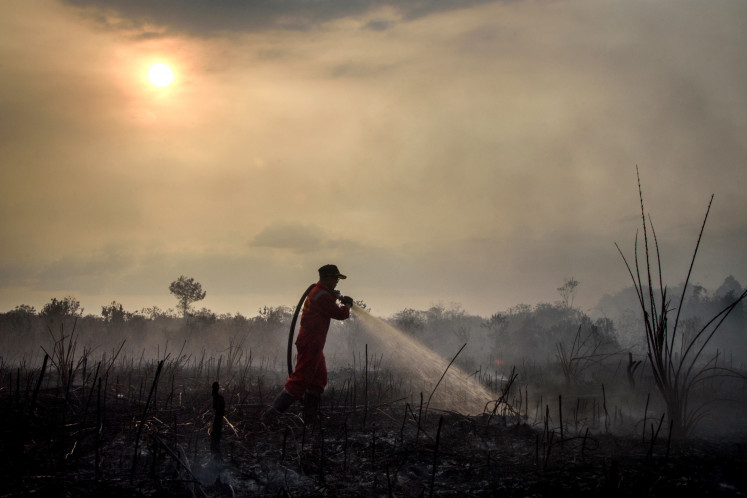Popular Reads
Top Results
Can't find what you're looking for?
View all search resultsPopular Reads
Top Results
Can't find what you're looking for?
View all search resultsCEOs most concerned about environmental issues in 2019
CEOs worldwide are most concerned about environment-related risks in 2019, as consumers’ growing environmental awareness could affect their businesses, according to the latest CEO outlook survey by business consultancy KPMG
Change text size
Gift Premium Articles
to Anyone
C
EOs worldwide are most concerned about environment-related risks in 2019, as consumers’ growing environmental awareness could affect their businesses, according to the latest CEO outlook survey by business consultancy KPMG.
Susanto, head of the clients and market partners division at KPMG Indonesia, said in a press briefing in Jakarta on Thursday that the executives were on alert over changing consumer behavior and changing regulations related to the environment, which may negatively affect their business operations.
He cited as an example the #NoStrawMovement initiated in Indonesia by NGO Drivers Clean Action and KFC in May last year. The movement compelled other major fast food chains, such as Bakmi GM and McDonalds, to stop serving plastic straws but did not have a significant negative impact on their operations.
A more business-impacting movement is a campaign against crude palm oil in the European Union, which has prompted governments to phase out the use of palm oil-based biofuels. This has fueled trade tensions between the EU and major CPO-producing countries like Indonesia and Malaysia.
“Globally, 76 percent of CEOs feel the future of their companies depend on how well they navigate a low-carbon environment and clean economy,” said KPMG Indonesia CEO Irwan Djaja during the press briefing over the survey on Thursday.
KPMG’s survey, which questioned 1,310 CEOs worldwide (including 10 in Indonesia) of multinational companies with annual turnover above US$500 million, found the second and third-biggest concerns were, respectively, digital disruption and territorialism — a synonym for protectionism.
“However, we found that CEOs in Indonesia were still most concerned over territorialism. Environmental risks were not a major concern among them,” noted Irwan.
Indonesia’s Palm Oil Producers Association (Gapki) repeatedly decried the EU’s palm oil ban as protectionism rather than a response to changing consumer preferences.
Environmentalist Andika Putraditama, sustainable commodities and business manager at World Resources Institute (WRI) Indonesia, attributed local CEOs lack of concern about environmental risks to a corresponding lack of consumer awareness.
“In Indonesia, most consumers are unaware that their consumption patterns are, for example, connected to deforestation in Kalimantan and Sumatra. If consumers voiced out that they don’t want their shampoo and snacks to be part of such deforestation, I’m sure local companies would give the environment higher priority,” he told The Jakarta Post.
He also pointed out that the movement against plastic straws and plastic bags, in Indonesia, was still limited to pocket demographics in Bali or large urban centers like Jakarta. Thus, the movement wouldn’t carry enough weight to get companies worried over environmental aspects.
KPMG’s survey, available at kpmg.com/CEOoutlook, also found that CEOs worldwide were less confident about short-term economic growth. The proportion of executives who foresee positive growth over the next three years fell from 67 percent last year to 62 percent this year.
Susanto said global CEOs expressed concern over Brexit and the United States-China trade war, among other economic uncertainties. Such concerns were even more pronounced among Indonesia’s CEOs, who worried most about protectionism.
Slipping CEO confidence in global markets aligns with the World Bank’s global economic outlook report released in June, which says the economy “has slowed to its lowest pace in three years”.
The World Bank forecasts global economic growth to slump from 3 percent last year to 2.6 percent this year, before recovering slightly to 2.7 percent next year.
“Heightened debt levels and subdued investment growth in developing economies are holding countries back from achieving their potential. It’s urgent that countries make significant structural reforms that improve the business climate and attract investment,” said World Bank Group president David Malpass in a statement.
However, there is a silver lining as the World Bank forecasts Indonesia’s economy to stabilize at 5.2 percent this year before reaching 5.3 percent next year.
Furthermore, 80 percent of Indonesian CEOs expect their businesses to grow at a modest but positive 2 percent this year. Ten percent expect their businesses to grow at above 10 percent, and the remaining 10 percent expect between 2 and 10 percent.
Susanto said the modest growth prediction was the result of expected digital disruption.
A case in point is that of the big three telecommunication providers: Telkom, XL and Indosat, which booked three year-low profits last year due to declining usage of credit-based SMSs and voice calls, which are being replaced by online messaging platforms like WhatsApp and Telegram.
In overcoming such disruption, KPMG’s survey found that 68 percent of CEOs globally preferred to merge and acquire tech companies to secure digital talent and technology, while the remaining 32 percent, many of whom run tech companies, prefer to upgrade their workforce through skill-training.
Susanto said that, in Indonesia, 80 percent of CEOs preferred mergers and acquisitions while 20 percent preferred workforce upgrades.










